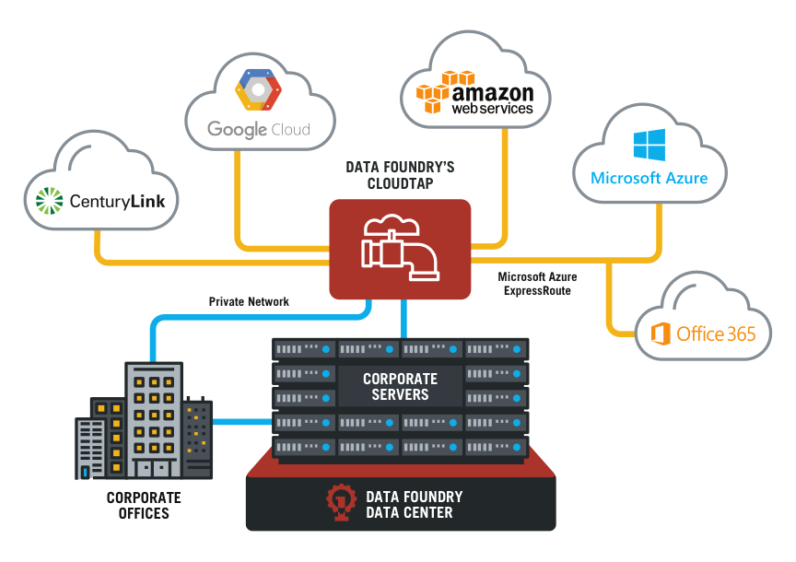
Hybrid cloud has become the most widely implemented cloud strategy. According to RightScale’s 2016 State of the Cloud report, 82% of companies have adopted a hybrid cloud model. In this model, companies run part of their infrastructure in private clouds and run the rest in public clouds. At the same time, the colocation industry continues to grow. The industry brought in $25.7 billion in revenue in 2015. This number is predicted to reach $36.1 billion this year and continue to increase at a rate of 16%. The reason for this positive correlation isn’t a mere coincidence. Companies are finding that colocation makes an excellent foundation for a hybrid cloud model.
According to Research and Markets, companies report they are using colocation facilities to support cloud storage and cloud computing. By using colocation with cloud services, companies are able to obtain the elusive combination of flexibility, scalability, security, control, reliability and cost-effectiveness that best suits their business model.
Cost Control
Some companies have decided on a hybrid strategy because they have seen how costs can quickly spin out of control in the public cloud. Philip Molter, CTO of Golden Frog, an Internet security solutions provider, and Giganews, one of the world’s largest Usenet providers says, “It’s easy to lose track of resources in the [public] cloud. Many companies might do the initial cost analysis properly, but what they don’t realize is how easy it is to spin up resources. Before they know it, costs are out of hand, and they are using more than they really need to use.”
Amazon’s S3 storage services cost 2.1 cents per gigabyte, and EBS runs at 10 cents per gigabyte. At this rate, 500 terabytes of S3 storage cost $10,500 per month, and 500 terabytes of EBS costs $50,000. These costs don’t include other resources companies would need if they relied completely on the cloud, such as network (4.5 cents/gigabyte) and compute resources, not to mention load balancing, firewalls, monitoring, and DNS services.
Because so many aspects of a business are online these days, the cost of public cloud services quickly skyrockets as a company grows. In most cases, data will only increase in volume. “The purchase and management of hard drives can be preferable to large cloud provider bills every month, especially if storage needs are well understood,” says Molter. By owning some of their own resources and using colocation, Giganews and other companies are better able to manage these costs. Recurring costs are lower per unit, and unlike resources in the cloud, IT departments are hyper-aware of when and how they are using their own resources. There aren’t any surprises when the bill arrives at the end of the month.
Connectivity
Many colocation providers offer cloud connectivity solutions that allow companies to connect to the cloud provider of their choice. Companies can arrange low latency, redundant paths and/or layer two connections to AWS, Azure, Google and others through their colocation providers to support the movement of workloads in and out of the cloud. This is a much more cost-effective solution than if a company were to build out these connections on their own. Colocation facilities can also provide interconnectivity between tenants, which allows companies to take advantage of partnerships and gain secure, direct access to SaaS applications they wouldn’t have if they were on their own.
Balancing Reliability & Flexibility
Companies that choose to establish private clouds in colocation facilities and use the public cloud for unpredictable bursts have the best of both worlds. They enjoy the security and control that comes owning and operating their own equipment and the reliability of a purpose-built data center with redundant infrastructure and 24×7 onsite security (depending on the provider they choose). They have the flexibility to add resources to their infrastructure for a one-time cost, or spin up a couple of resources in the cloud when usage is unpredictable.
Data Foundry supports a hybrid cloud model with CloudTap®, a private, dedicated connection to cloud providers. Learn more.
